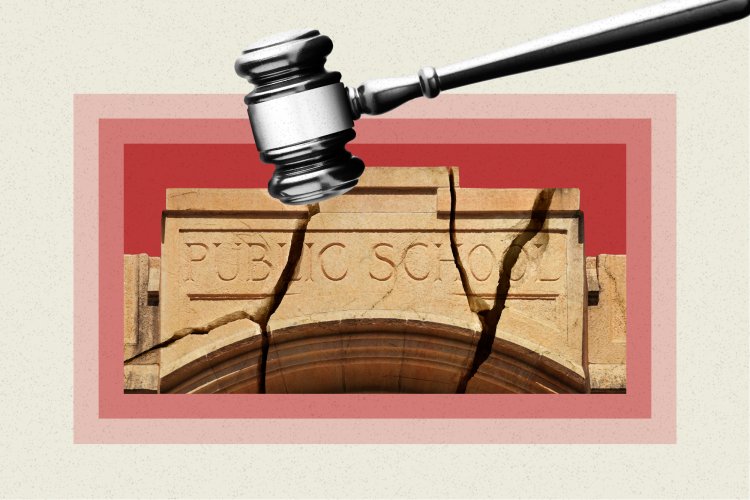An Unexpected Source Poses the Greatest Threat to Public Education -- Editorial
It's been a longstanding aspiration for the conservative movement.

Yes, he's attempting to dismantle the Department of Education and restrict what schools can teach about race. However, the more significant threat looming ahead arises from the Supreme Court.
This is especially disheartening because the Supreme Court has historically been one of the strongest advocates for public education. In 1954, in Brown v. Board of Education, the court described public schooling as “the very foundation of good citizenship” and “the most important function of state and local governments.” Just four years ago, with an 8-1 opinion about a cheerleader's Snapchat antics, the court proclaimed that “Public schools are the nurseries of democracy.”
Later this month, the court will hear oral arguments in two cases that have the potential to radically destabilize public schools as we know them. There is considerable concern about how the conservative majority will rule.
The first case, Oklahoma Statewide Charter School Board v. Drummond, questions whether the 46 states with charter schools must provide public funds to institutions that teach religious doctrine as truth. The second case, Mahmoud v. Taylor, involves claims by religious parents seeking the right to opt their children out of contentious public school curricula.
Together, Drummond and Mahmoud challenge the fundamental principles of the American education system affirmed by Brown six decades ago: since that landmark ruling, public schools have operated on norms of inclusive enrollment and have provided all children with a shared curriculum reflecting the values essential for civic participation and economic success.
If the court dismantles these foundational principles, the education system that remains will be but a shadow of the democracy-promoting institution previously upheld by the court and supported by healthy majorities of parents in their local communities. Although there are ways to mitigate the worst possible outcomes in both cases, the future is uncertain; the court must adhere to historical precedents fairly while progressives need to be willing to seek a middle ground.
The legal disputes in Drummond and Mahmoud are not new or spontaneous; they represent a long-term conservative strategy aimed at undermining public education.
A significant part of this strategy has been the ongoing push for school choice, a term that encompasses various programs like school vouchers and educational savings accounts that divert taxpayer funds from traditional public schools to private institutions. Drummond’s call for a constitutional entitlement to taxpayer-funded religious education can be viewed as a crucial part of Project 2025’s “core principle” of “significantly advanc[ing] education choice.”
Conservatives have also sought to depict public schools as proponents of “woke” ideology rather than as facilitators of a unified set of community values. The argument in Mahmoud – a parent's right to exempt their child from curricular choices deemed religiously objectionable – represents another part of the larger culture wars, where conservatives are seeking a legal advantage from the court.
To many in the Republican Party, public schools have become a “radical, anti-American” adversary. Seen through this lens, Drummond and Mahmoud may be viewed as the most significant opportunity to deliver a decisive blow.
Technically, the Drummond case pertains only to Oklahoma, stemming from the state’s decision to withhold funding from a religious charter school, the St. Isidore of Seville Catholic Virtual School.
However, the stakes are especially high for blue states. If St. Isidore wins the right to public funding in Oklahoma, it would set a precedent for religious charter schools in California and New York, where taxpayer funds have not previously supported K-12 education teaching religion as truth.
The potential ramifications of this are enormous. Nonreligious charter schools receive over $26 billion in public funding and educate approximately four million children. A ruling favoring religious charter schools could induce billions for religious education—a development one Catholic school executive described as “game-changing” for expanding religious school networks.
Yet, the implications extend beyond financial concerns. They threaten the essential vision of public schools as spaces where children from diverse backgrounds learn the “values on which our society rests,” as characterized by the Supreme Court. Drummond would transform the American education system into a mechanism for transmitting each family’s religious beliefs, financed with taxpayer money.
Moreover, religious charter schools may argue they have a Free Exercise right to limit enrollment strictly to members of their faith. Such a ruling would create a publicly funded K-12 educational system that divides the American populace at a time when unity is desperately needed.
Justice Thurgood Marshall warned that “unless our children begin to learn together, there is little hope that our people will ever learn to live together.” A ruling in favor of religious charter schools in Drummond would bring us closer to the divisive world Marshall feared.
In the Mahmoud case, the issue originated from a 2022 policy by the Montgomery County, Maryland, school board, which included new LGBTQ-inclusive storybooks in its pre-K through 12th-grade language arts curriculum. While the books aimed to foster respect for diversity, they sparked controversy, particularly when one book designed for pre-K invited students to find images of a lip ring and a drag queen.
Initially, Montgomery County allowed parents to exempt their children from these readings, but the district eventually rescinded that option, prompting the Mahmoud family to sue. They argue that the Free Exercise Clause gives parents the right to opt their children out of public school instruction that significantly interferes with their religious upbringing.
This case presents a complex predicament, even for someone who strongly advocates for LGBTQ students' safety. One can support that position while recognizing that compelling young children to read books like Pride Puppy against their parents’ wishes is not a straightforward matter. Indeed, Montgomery County has since removed Pride Puppy from its curriculum—a reasonable compromise.
However, the primary concern in this case is not merely about opting out of reading controversial materials for young children. A ruling affirming a parental opt-out right could set a precedent difficult to regulate sensibly. Would parents of older children be able to opt them out of any assignment that supports LGBTQ rights? Could they choose to exempt their children from science classes covering biology or evolution? What about history courses that might conflict with religious beliefs?
Previously, lower federal courts have unanimously rejected the notion that a parent’s religious objections can excuse their child from shared educational objectives. Mahmoud threatens to disrupt that consensus, leading to a public school environment compelled to cater to the diverse religious views of families.
This would undoubtedly impart certain values to children, but they would no longer be the communal values that are vital for a cohesive society.
As for the future of public education at the Supreme Court, the plaintiffs in both Drummond and Mahmoud may fall into the trap of believing the 6-3 conservative majority will align with them; religious litigants have seen considerable success recently at the court.
Yet in Drummond, there exists a compelling argument against the alleged Free Exercise right to taxpayer-funded religious schools, grounded in the very history and tradition that has shaped the conservative tilt of the court on issues like abortion and gun rights.
Research by Ethan Hutt and myself reveals that the denial of funding that St. Isidore claims has historical roots dating back to the founding era. During that time, it was commonplace for public funding to be withheld from religious institutions, yet no religious leaders or parents ever litigated such issues based on the Free Exercise claims now being asserted.
This historical pattern mirrors the reasoning applied by the Supreme Court to reject the right to abortion in Dobbs: “When legislators began to [ban abortion in the 19th century], no one, as far as we are aware, argued that [they had] violated a fundamental right.”
If the absence of legal challenges to government actions 200 years ago indicates that the Constitution’s original meaning does not support a claimed right to abortion, then the same logic should hold regarding religious school funding. The court can adhere to its originalist stance or recognize the right to religious charter school funding claimed in Drummond, but it cannot do both.
In Mahmoud, the argument to protect public education is less defined; however, Maryland officials have a chance to avert a Supreme Court ruling that could jeopardize evolution, biology, history, and LGBTQ-inclusive lessons. They can override the Montgomery County policy and offer parents of young children like the Mahmouds the choice to opt out.
Such a move has legal precedent. After New York officials took similar action to resolve a policy conflict in a significant gun case in 2020, the court dismissed that case as moot, delaying a potentially harmful ruling.
However, this would necessitate lawmakers in Maryland to embrace parents' rights to withdraw children from reading controversial LGBTQ-inclusive books. Lawmakers might recognize a principled distinction between fostering safe spaces for LGBTQ students—a fundamental value—and using elementary classrooms to address contentious topics generally.
Truthfully, progressives were likely never going to prevail in kindergarten classrooms, particularly given the current political climate. Advancements in social attitudes toward the transgender community are more likely by leveraging mainstream media, social media, and the realization that friends and family in these communities deserve equal respect.
Ultimately, the Supreme Court may choose to disregard historical precedents in Drummond for the sake of a conservative agenda. A policy shift in Maryland could merely postpone the inevitable, as new cases may arise asserting a parental opt-out right in the future.
The broader takeaway, then, is the ongoing battle against public education and its consequences. Public schools have played a crucial role in shaping America's greatness. So the efforts to undermine public education through the Drummond and Mahmoud cases could lead to significant repercussions, including diminished social tolerance, lower international competitiveness, and continued economic and racial inequality.
However, the most profound cost may be to our democracy. The Supreme Court reminded us just four years ago that public schools are where our democracy is nurtured. Consequently, the timing of these cases couldn't be worse. At a time when American democracy is facing unprecedented challenges, the court should not be the institution leading the charge to dismantle our public schools.
Scott R Wilson for TROIB News












